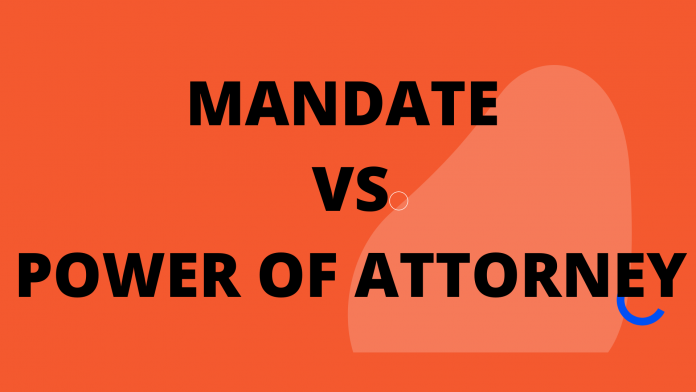WHAT IS POWER OF ATTORNEY?
Power of attorney (authorization) is a document in which individuals, and representatives at law of legal entities authorize other persons to represent or act on his (or her) behalf in the establishment and/or performance of civil transactions.
A power of attorney only applies to properties & is required to be stamped in accordance with the provisions of the Indian Stamp Act and also according to various amendments effected by States.
READ MORE: WATCH OUR DAILY IIBF JAIIB/CAIIB LIVE CLASSES
TYPES OF POWER OF ATTORNEY –
The Power of Attorney can be made in two types, special and general-
- SPECIAL POWER OF ATTORNEY – A special or limited power of attorney is used on a limited basis for one-time financial or banking transactions, or for the sale of a particular property. The agent has no other authority to act on behalf of the principal other than what is assigned to them in the limited power of attorney.
- GENERAL POWER OF ATTORNEY – A general power of attorney is given for a general purpose intended to operate for a length of time.
Read Also: JAIIB May 2024 Online Crash Course
WHAT IS A MANDATE?
A mandate commonly known as a protection mandate is a document that allows an individual to appoint one or more persons to look after him (her) and his (her) properties in the event that the individual becomes incapable.
The mandatory or mandataries must be of legal age and must also be capable of performing the obligation assigned to them.
In the case of Joint accounts, all the depositors must sign the mandate letter.
In the case of partnership firms, all the partners of the firm must sign the mandate letter.
In the case of H.U.F., the mandate must be signed by Karta and all the major co-parceners. In case the mandate is to be issued in favor of a third party an Indemnity has to be executed by the Karta and major co-parceners of the H.U.F.
READ MORE: HOW TO CLEAR JAIIB IN 2024 EASILY ON THE FIRST ATTEMPT
DIFFERENCE BETWEEN MANDATE AND POWER OF ATTORNEY
- A power of attorney applies only to property, whereas a mandate can also apply to the protection of the person.
- The power of attorney takes effect when the mandator so decides he may terminate it at any time.
The power of attorney becomes invalid when the mandator is no longer able to oversee the actions of the mandatary or when the Court has declared the mandatory incapacitated. In contrast, a protection mandate only takes effect after the homologation process and it can only be revoked by the Court order.
- Power of Attorney is made and signed by the Principal whereas the mandate contract shall be made and signed by Mandatary and Mandator.
- Power of Attorney must be stamped whereas a Mandate is unstamped.
READ MORE: HOW TO CLEAR CAIIB IN 2023 EASILY ON THE FIRST ATTEMPT
Also Like:






Thanks for providing this topic and also explained so well. Thank u so much.
Very well explained this topic. Thank you so much sir.